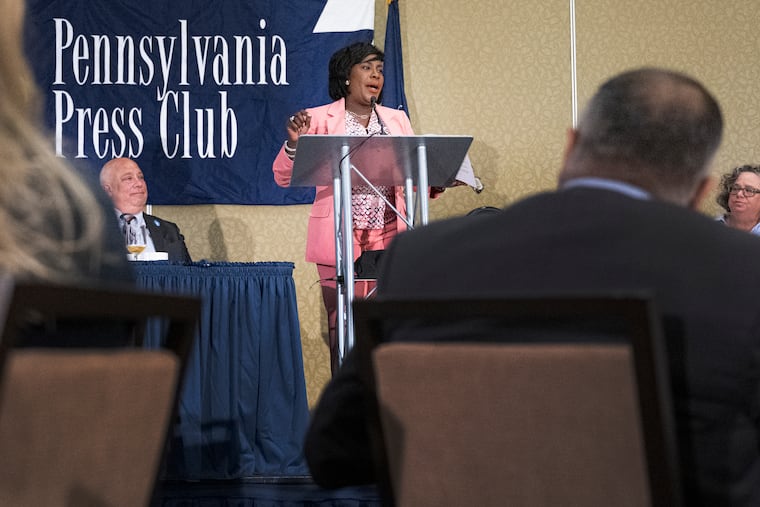Mayor Cherelle Parker called out her detractors and lobbied for education funding in a visit to Harrisburg
Parker, who served in the state House for 10 years before being elected to City Council and becoming mayor, touted her priorities for Philadelphia in her state Capitol visit.

HARRISBURG — As Pennsylvania’s state budget deadline looms, Philadelphia Mayor Cherelle L. Parker visited the state Capitol to ask that lawmakers finally increase public education funding and raise the minimum wage to $15 an hour — and to challenge her political opponents for setting low expectations of the city.
Parker, who served in the state House for 10 years before being elected to City Council and then becoming mayor, said in an interview that she wasn’t in Harrisburg to play politics. She said she also held meetings Monday with state agencies to request streamlined rules and regulations that would make it easier to implement her priorities in the city, such as her promise to shut down the open-air drug market in Kensington.
“The city can’t get it done alone,” Parker said. ”We have limited revenue-generating capacity. I’m doing the best I can and working with those leaders, and I thank them for ensuring that they keep Philadelphia’s needs foremost in their advocacy.”
State legislators and Gov. Josh Shapiro are in the home stretch of budget negotiations this week; they must agree on a budget for the next fiscal year by July 1.
Parker boasted her ability to convene stakeholders across industries, including an unusual group of public education leaders who sent a letter to Shapiro, asking that leaders approve proposed school funding changes. If approved, that plan would bring $1.4 billion more in state money to Philadelphia schools in the next seven years.
“We will not allow anyone to pit us against each other,” Parker said. “There are no divisions in Philadelphia to take advantage of.”
However, there is one division she expertly avoided: school vouchers. Parker said she has declined to take a stance on whether she supports vouchers to send students in struggling school districts to private schools because it could obstruct Philly’s lawmakers as they negotiate a final budget deal.
“If I feel like I need to be heard from on any issue, not just that one particular issue, on any issue, I will make sure my voice is heard,” Parker added.
This year marks the first state budget since Parker became mayor of Pennsylvania’s most populous city. She said it felt like a “homecoming” for her to come to Harrisburg to lobby on behalf of the city. She called on legislators to raise the state minimum wage to $15 an hour as a “number one way” to bring Philadelphians out of poverty.
Parker also spoke to lobbyists, lawmakers, and reporters at the Pennsylvania Press Club on Monday, and touted her efforts to make Philadelphia the “safest, cleanest, and greenest” city in America.
Parker also challenged her opponents who have cast doubt on the city’s ability to pursue an ambitious cleaning agenda.
The mayor called out politicians who questioned whether the Parker administration could complete its plan to deep-clean every city block over 13 weeks.
“I won’t apologize for being ambitious, I won’t apologize for being bold,” Parker said, “I won’t apologize for reaching high.”